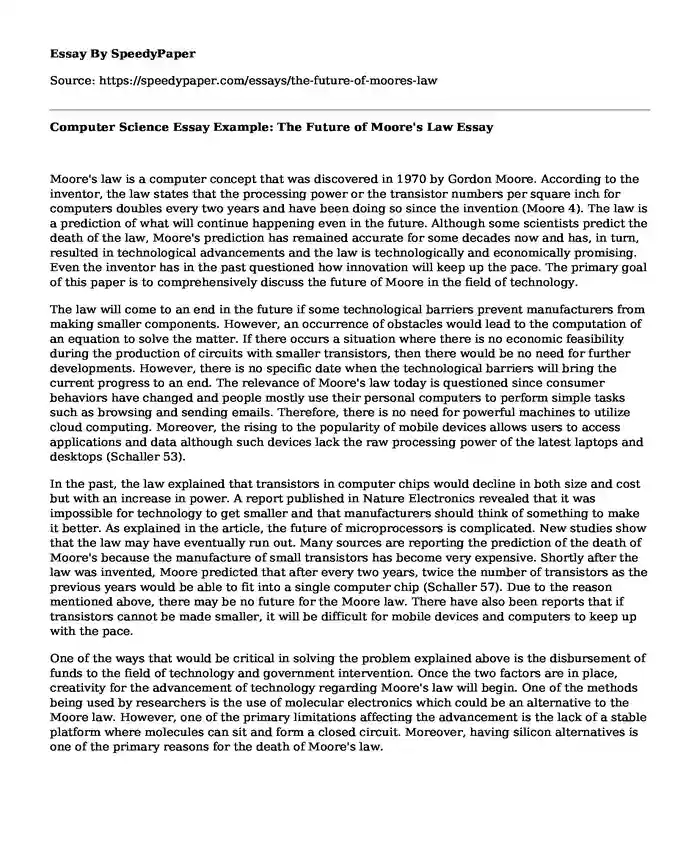
| Type of paper: | Term paper |
| Categories: | Computer science |
| Pages: | 3 |
| Wordcount: | 603 words |
Moore's law is a computer concept that was discovered in 1970 by Gordon Moore. According to the inventor, the law states that the processing power or the transistor numbers per square inch for computers doubles every two years and have been doing so since the invention (Moore 4). The law is a prediction of what will continue happening even in the future. Although some scientists predict the death of the law, Moore's prediction has remained accurate for some decades now and has, in turn, resulted in technological advancements and the law is technologically and economically promising. Even the inventor has in the past questioned how innovation will keep up the pace. The primary goal of this paper is to comprehensively discuss the future of Moore in the field of technology.
The law will come to an end in the future if some technological barriers prevent manufacturers from making smaller components. However, an occurrence of obstacles would lead to the computation of an equation to solve the matter. If there occurs a situation where there is no economic feasibility during the production of circuits with smaller transistors, then there would be no need for further developments. However, there is no specific date when the technological barriers will bring the current progress to an end. The relevance of Moore's law today is questioned since consumer behaviors have changed and people mostly use their personal computers to perform simple tasks such as browsing and sending emails. Therefore, there is no need for powerful machines to utilize cloud computing. Moreover, the rising to the popularity of mobile devices allows users to access applications and data although such devices lack the raw processing power of the latest laptops and desktops (Schaller 53).
In the past, the law explained that transistors in computer chips would decline in both size and cost but with an increase in power. A report published in Nature Electronics revealed that it was impossible for technology to get smaller and that manufacturers should think of something to make it better. As explained in the article, the future of microprocessors is complicated. New studies show that the law may have eventually run out. Many sources are reporting the prediction of the death of Moore's because the manufacture of small transistors has become very expensive. Shortly after the law was invented, Moore predicted that after every two years, twice the number of transistors as the previous years would be able to fit into a single computer chip (Schaller 57). Due to the reason mentioned above, there may be no future for the Moore law. There have also been reports that if transistors cannot be made smaller, it will be difficult for mobile devices and computers to keep up with the pace.
One of the ways that would be critical in solving the problem explained above is the disbursement of funds to the field of technology and government intervention. Once the two factors are in place, creativity for the advancement of technology regarding Moore's law will begin. One of the methods being used by researchers is the use of molecular electronics which could be an alternative to the Moore law. However, one of the primary limitations affecting the advancement is the lack of a stable platform where molecules can sit and form a closed circuit. Moreover, having silicon alternatives is one of the primary reasons for the death of Moore's law.
Works Cited
Moore, Gordon E. "Lithography and the future of Moore's law." Integrated Circuit Metrology, Inspection, and Process Control IX. Vol. 2439. International Society for Optics and Photonics, 1995.
Schaller, Robert R. "Moore's law: past, present and future." IEEE spectrum 34.6 (1997): 52-59.
Cite this page
Computer Science Essay Example: The Future of Moore's Law. (2022, Sep 23). Retrieved from https://speedypaper.com/essays/the-future-of-moores-law
Request Removal
If you are the original author of this essay and no longer wish to have it published on the SpeedyPaper website, please click below to request its removal:
- Free Essay on Human Aggression in the Millennium Generation
- Essay Example on Epistemological Research
- Disparities in Education, Essay Example
- Law Essay Example: Issue Fluidity in the Supreme Court
- Sample Essay on Review The Marrow Thieves
- Essay Sample on Should Patients Be Knowledgeable About Their Care
- Free Essay Example: Types of Business Organization
Popular categories




